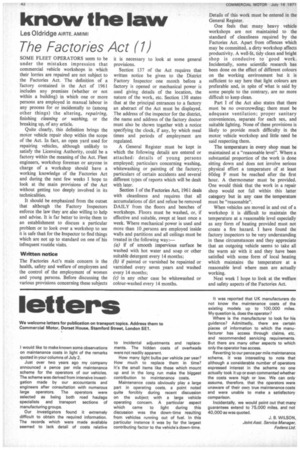know the law
Page 44

If you've noticed an error in this article please click here to report it so we can fix it.
Les Oldriclge AIRTE, AMIMI
The Factories Act (1)
SOME FLEET OPERATORS seem to be under the mistaken impression that commercial vehicle workshops in which their lorries are repaired are not subject to the Factories Act. The definition of a factory contained in the Act of 1961 includes any premises (whether or not within a building) in which one or more persons are employed in manual labour in any process for or incidentally to (among other things) the altering, repairing, finishing cleaning or washing, or the breaking up, of any article.
Quite clearly, this definition brings the motor vehicle repair shop within the scope of the Act. In fact. an open yard used for repairing vehicles, although unlikely to satisfy the Licensing Authority, could be a factory within the meaning of the Act. Fleet engineers, workshop foreman or anyone in charge of a workshop should have a working knowledge of the Factories Act and during the next few weeks I hope to look at the main provisions of the Act without getting too deeply involved in its technicalities.
It should be emphasized from the outset that although the Factory Inspectors enforce the law they are also willing to help and advise. It is far better to invite them to an establishment to discuss a particular problem or to look over a workshop to sec it is safe than for the Inspector to find things which are not up to standard on one of his infrequent routine visits.
Written notice The Factories Act's main concern is the health. safety and welfare of employees and the control of the employment of women and young persons. Before discussing the various provisions concerning these subjects it is necessary to look at some general provisions.
Section 137 of the Act requires that written notice be given to the District Factory Inspector one month before a factory is opened or mechanical power is used giving details of the location, the nature of the work, etc. Section 138 states that at the principal entrances to a factory an abstract of the Act must be displayed. The address of the inspector for the district, the name and address of the factory doctor must also be shown together with a notice specifying the clock, if any, by which meal times and periods of employment are regulated.
A General Register must be kept in which the following detail § are entered or attached: details of young persons employed; particulars concerning washing, whitewashing or painting of the factory; particulars of certain accidents and several different types of reports which will be dealt with later.
Section I of the Factories Act, 1961 deals with cleanliness and requires that all accumulations of dirt and refuse be removed DAILY from the floors and benches of workshops. Floors must be washed, or, if effective and suitable, swept at least once a week. Where mechanical power is used and more than 10 .persons are employed inside walls and partitions and all ceilings must be treated in the following way:—
(a) if of smooth impervious surface be washed with hot water and soap or other suitable detergent every 14 months: (b) if painted or varnished be repainted or varnished every seven years and washed every 14 months; (c) in any other case be whitewashed or colour-washed every 14 months. Details of this work must be entered in the General Register.
One feels that many heavy vehicle workshops are not maintained to the standard of cleanliness required by the Factories Act. Apart from offences which may be committed, a dirty workshop affects productivity. A well-lit, tidy clean and bright shop is conducive to good work. Incidentally, some scientific research has been done on the effect of different colours on the working environment but it is sufficient to say here that light colours are preferable and, in spite of what is said by some people to the contrary, are no more difficult to keep clean.
Part I of the Act also states that there must be no overcrowding; there must be adequate ventilation; proper sanitary conveniences, separate for each sex, and suitable lighting. None of these provisions is likely to provide much difficulty in the motor vehicle workshop and little need be said respecting them.
The temperature in every shop must be maintained at a -reasonable level". Where a substantial proportion of the work is done sitting down and does not involve serious physical effort a temperature of at least 60deg F must be reached after the first hour. A thermometer must be provided. One would think that the work in a repair shop would not fall within this latter category but in any case the temperature must be "reasonable-.
When vehicles are moved in and out of a workshop it is difficult to maintain the temperature at a reasonable level especially as any form of heating provided must not create a fire hazard. I have found the factory inspectors to be very understanding in these circumstances and they appreciate that an outgoing vehicle seems to take all the warm air with it and they have been satisfied with some form of local heating which maintains the temperature at a reasonable level where men are actually working.
Next week I hope to lbok at the welfare and safety aspects of the Factories Act.




























































































